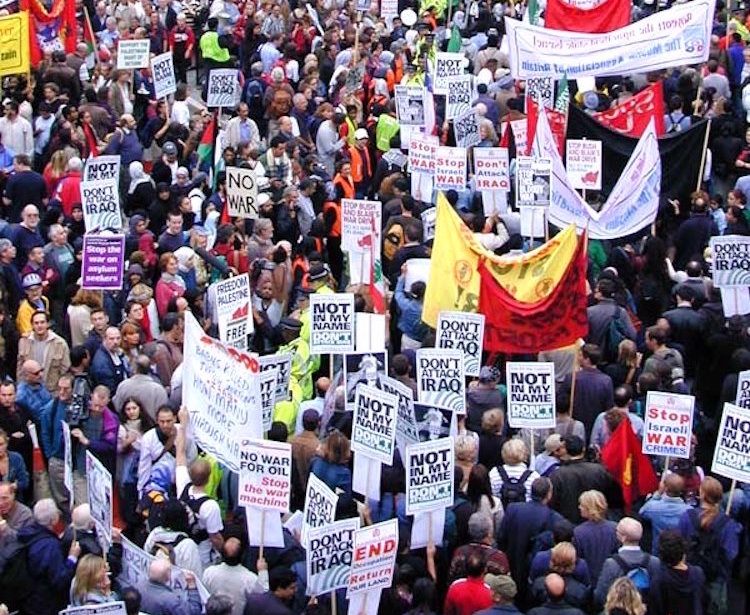Viewpoint by Jonathan Power
LUND, Sweden (IDN-INPS) – The crime of aggression (“planning, preparation, initiation or waging of a war of aggression”) was described by the Nuremberg Tribunal that tried Nazi leaders as “the supreme international crime differing only from other war crimes in that it contains within itself the accumulated evil of the whole”.
President George W. Bush and British prime minister, Tony Blair, have been accused by many as war criminals for starting the war against Iraq and, second, for not watching carefully enough to make sure that war crimes carried out by individual soldiers were not covered up, and for the torture that Bush initiated and Blair appeared to tolerate.
Did Blair lie over the reason for going to war with Iraq – the supposed stockpile of weapons of mass destruction that Iraq possessed? It depends how you define lie. If you define lie as saying this cat is black when in fact it’s white he didn’t on the big issues. But what he did do was to give the impression the cat was assuredly white when in fact it was a sort of greyish.
But as the just published government commissioned report made by a distinguished civil servant, John Chilcot, has made clear the caveats were left out of intelligence briefings and the presentation was polished by the prime minister’s office. We in the public didn’t have the pre-polished version but Blair did and he must have known in his mind, if not his heart, he was taking a gamble with the evidence.
Why he was not prepared to persuade George Bush to wait a few more weeks until the evidence that Hans Blix, the chief UN arms inspector, was in the midst of collecting on the ground inside Iraq, was available, was gravely irresponsible.
Moreover, sanctions had Saddam boxed in. He was able to harm no one outside his country. The UN policing and inspecting, imposed after the first Gulf War, had led to ridding Iraq of all the weapons of mass destruction. The war itself had effectively wiped out Saddam’s air force and navy and broken the back of his army.
Evidence has come to light that Bush, with Blair’s knowledge and support, had given the green light for going to war long before Blix got to work. Blair covered this up.
Yes, the word “lie” cannot quite be used, although it was pretty near it. The Conservative Party, then in opposition, banded the word around. But in a related matter it can. It concerns the controversy over the naming of the Ministry of Defence’s weapons’ expert, David Kelly, who shortly after he was ousted in the press as the source of reports claiming the government’s public dossier on Iraq’s weapons had been “sexed up”, committed suicide.
Although an inquiry exonerated Blair of any blame for precipitating the suicide, a BBC interview much later caught Blair out, lying in a way we could all understand. He told the interviewer, “I don’t believe we had any option, however, but to disclose his name [to the press].”
Until that interview Blair had always maintained that it was “completely untrue” that the government had done this.
A.N. Wilson, the acerbic novelist and literary critic, wrote in the Financial Times in January 2014 that “the obvious lesson is that the war brought more disasters than it solved. It is not one that we’d expect many politicians to have learnt, for politicians get drunk on war; they enjoy it. Witness the obscene expression on Tony Blair’s face, to this day, when he defends the invasion of Iraq”.
The UK’s ambassador to the U.S. during the run up to the war, Christopher Meyer, wrote a scathing attack on Blair, who he served, in his book “DC Confidential”. He argued that Blair could have secured a delay to the start of military action and thus bought time for post-conflict planning that might have avoided much of the violence now plaguing Iraq. A delay would also have made it possible for Blix to properly finish his job and prove beyond all doubt that Iraq did not possess weapons of mass destruction.
Meyer wrote that Blair was “seduced” by the “glamour” of U.S. power and failed to take tough negotiating positions. As a result, the prime minister let himself “be taken for granted” by the White House. “We may have been the junior partner in the enterprise but the ace up our sleeve was that America did not want to do it alone.”
Meyer’s colleague, Rodric Braithwaite, former UK ambassador to Moscow and later chairman of the Joint Intelligence Committee that prepares intelligence for the prime minister, wrote in the Financial Times in August 2006, whilst Blair was still in power, saying much the same thing: “Blair’s total identification with the White House has destroyed his influence in Washington, Europe and the Middle East itself. Who bothers with the monkey if he can go straight to the organ-grinder?” He then added: “A spectre is stalking British television, a frayed and waxy zombie straight from Madame Tussaud’s”.
Never have I read such a vicious attack on a prime minister by a former top diplomat. Braithwaite continues: “Stiff in his opinions, but often in the wrong, Blair has manipulated public opinion, sent our soldiers into distant lands for ill-conceived purposes and misused the intelligence agencies”.
Blair and Bush were responsible for starting an unnecessary war that claimed half a million lives. Isn’t this an evil big enough for them to be charged with war crimes? [IDN-INPS – 12 July 2016]
Note: Jonathan Power syndicates his opinion articles. He forwarded this and his previous Viewpoints for publication in IDN-INPS. Copyright: Jonathan Power
Photo: Anti-war protest in London, 2002. Credit: Wikimedia Commons.
IDN is flagship of the International Press Syndicate.

